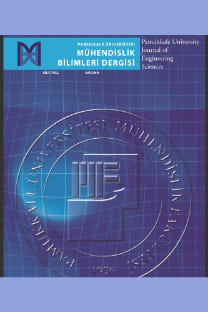Tabakalı ve fonksiyonel olarak kademelendirilmiş küresel basınç kapları üzerine analiz
Heterojen küresel basınç kabı, FKM, Tabakalı malzeme, Elastik limit, Von Mises akma kriteri
Analysis on multi-layered and functionally graded spherical pressure vessels
Heterogeneous spherical pressure vessel, FGM, Multi-layered material, Elastic limit, Von Mises yield criterion,
___
- Timoshenko SP, Goodier JN. Theory of Elasticity. 3rd ed. New York, USA, McGraw-Hill, 1970.
- Gamer U. "The expansion of the elastic-plastic spherical shell with nonlinear hardening". International Journal of Mechanical Science, 30(6), 415-426, 1988.
- Jiang W. "Hollow spheres subjected to sustained and variable loads". Journal of Engineering Mechanics, 120(6), 1343-1368, 1994.
- Zhifei S, Taotao Z, Hongjun X. "Exact solutions of heterogeneous elastic hollow cylinders". Composite Structures, 79(1), 140-147, 2007.
- Ghannad M, Rahimi GH, Nejad MZ. "Elastic analysis of pressurized thick cylindrical shells with variable thickness made of functionally graded materials". Composites Part B: Engineering, 45(1), 388-396, 2013.
- Bufler H. "The arbitrarily and the periodically laminated elastic hollow sphere: exact solutions and homogenization". Archives of Applied Mechanics, 68(9), 579-588, 1998.
- Liu PF, Xing LJ, Zheng JY. "Failure analysis of carbon fiber/epoxy composite cylindrical laminates using explicit finite element method". Composites Part B: Engineering, 56, 54-61, 2014.
- Roy AK, Massard TN. "A design study of thick multilayered composite spherical pressure vessels". Journal of Reinforced Plastics and Composites, 11(5), 479-493, 1992.
- Borisov AV. "Elastic analysis of multilayered thick-walled spheres under external load". Mechanika, 4(84), 28-32, 2010.
- Lutz MP, Ferrari M. "Compression of a sphere with radially varying elastic moduli". Composites Engineering, 3(9), 873-884, 1993.
- Tutuncu N, Ozturk M. "Exact solutions for stresses in functionally graded pressure vessels". Composites Part B: Engineering, 32(8), 683-686, 2001.
- You LH, Zhang JJ, You XY. "Elastic analysis of internally pressurized thick-walled spherical pressure vessels of functionally graded materials". International Journal of Pressure Vessels and Piping, 82(5), 347-354, 2005.
- Guven U, Baykara C. "On stress distributions in functionally graded isotropic spheres subjected to internal pressure". Mechanics Research Communications, 28(3), 277-281, 2001.
- Nejad MZ, Gharibi M. "Effect of material gradient on stresses of thick FGM spherical pressure vessels with exponentially-varying properties". Journal of Advanced Materials and Processing, 2(3), 39-46, 2014.
- Bayat Y, Ghannad M, Torabi H. "Analytical and numerical analysis for the FGM thick sphere under combined pressure and temperature loading". Archives of Applied Mecha, 82(2), 229-242, 2012.
- Chen YZ, Lin XY. "Elastic analysis for thick cylinders and spherical pressure vessels made of functionally graded materials". Computational Materials Science, 44(2), 581-587, 2008.
- Karami K, Abedi M, Nejad MZ, Lotfian MH. "Elastic analysis of heterogeneous thick-walled spherical pressure vessels with parabolic varying properties". Frontiers of Mechanical Engineering, 7(4), 433-438, 2012.
- Chen YZ, Lin XY. "An alternative numerical solution of thick-walled cylinders and spheres made of functionally graded materials". Computational Materials Science, 48(3), 640-647, 2010.
- Atashipour SA, Sburlati R, Atashipour SR. "Elastic analysis of thick-walled pressurized spherical vessels coated with functionally graded materials". Meccanica, 49(12), 2965-2978, 2014.
- Carrera E, Soave M. "Use of functionally graded material layers in a two-layered pressure vessel". Journal of Pressure Vessel Technology, 133(5), 1202-1212, 2011.
- Akış T. "Elastoplastic analysis of functionally graded spherical pressure vessels". Computational Materials Science, 46(2), 545-554, 2009.
- Kieback B, Neubrand A, Riedel H. "Processing techniques for functionally graded materials". Materials Science and Engineering: A, 362(1-2), 81-106, 2003.
- Gandra J, Miranda R, Vilaca P, Velhinho A, Teixeira JP. "Functionally graded materials produced by friction stir processing". Journal of Materials Processing Technology, 211(11), 1659-1668, 2011.
- Choi SH, Cheung HH. "A topological hierarchy-based approach to layered manufacturing of functionally graded multi-material objects". Computers in Industry, 60(5), 349-363, 2009.
- Shin K, Natu H, Dutta D, Mazumder J. "A method for the design and fabrication of heterogeneous objects". Materials & Design, 24(5), 339-353, 2003.
- Cannillo V, Lusvarghi L, Siligardi C, Sola A. "Effects of different production techniques on glass-alumina functionally graded materials". Ceramics International, 34(7), 1719-1727, 2008.
- Fraldi M, Carannante F, Nunziante L. "Analytical solutions for n-phase functionally graded material cylinders under de saint venant load conditions: Homogenization and effects of poisson ratios on the overall stiffness". Composites Part B: Engineering, 45(1), 1310-1324, 2013.
- Lannutti JJ. "Functionally graded materials: Properties, potential and design guidelines". Composites Engineering, 4(1), 81-94, 1994.
- Elastic Properties and Young Modulus for some Materials. The Engineering ToolBox. “Standart Arama”. http://www.engineeringtoolbox.com/young-modulus-d_417.html (02.06.2016).
- ISSN: 1300-7009
- Başlangıç: 1995
- Yayıncı: PAMUKKALE ÜNİVERSİTESİ
Tabakalı ve fonksiyonel olarak kademelendirilmiş küresel basınç kapları üzerine analiz
Rüzgâr çiftliklerinde veri zarflama analizi ve Malmquist endeksi yaklaşımları ile performans analizi
Yunus EROĞLU, Serap Ulusam SEÇKİNER
Ensar Yıldırım, Halit Cebi, Murat Şen, Erkan Serdar Yılmaz
Yerel olmayan elastisite teorisine göre akışkan taşıyan nanokirişin serbest titreşimlerinin analizi
Süleyman Murat Bağdatlı, Necla Toğun
Ders programı çizelgeleme problemi için bir literatür taraması
Eş kalıp ekstrüzyon yöntemi ile alüminyum-magnezyum makrokompozit imalatı ve karakterizasyonu
Geri dönüştürülmüş kestamidlerin mekanik özellikleri
Yığın üretim yapan fırınlara işlerin yüklenmesi ve çizelgelenmesi: Tamsayılı programlama modeli
Kısa dönemli tahminlerde kullanılan uyarlamalı üstel düzleştirme için bulanık ayarlama yaklaşımı
